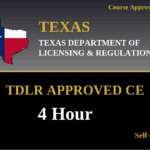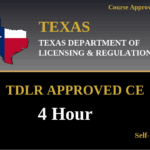
Renewing Your Texas Electrical License: A Guide
This guide will walk you through everything you need to know for a smooth renewal, from the specific course requirements for every license type to the critical code updates you can’t afford to ignore. Staying compliant isn’t just about avoiding penalties; it’s a mark of professionalism that keeps you at the top of your trade.
Your Annual Renewal Checklist: The 4-Hour CE Requirement
According to the Texas Department of Licensing and Regulation (TDLR), nearly every electrician license type requires the completion of four hours of continuing education each year to be eligible for renewal. These hours must be completed with a TDLR approved provider before your license expiration date. The curriculum is specifically designed to keep you current with state laws and national safety standards. According to TDLR requirements published in Texas Administrative Code, Chapter 73, your coursework must cover:
- The National Electrical Code (NEC)
- Texas Electrician Law (Occupations Code, Chapter 1305)
- Texas Electrician Administrative Rules (16 TAC, Chapter 73)
- Electrical Safety as defined by NFPA 70E
If you hold multiple licenses, such as a Master and a Journeyman license, you only need to complete one 4-hour CE course for your renewal.
CE Requirements and Fees by License Type
While the 4-hour CE requirement is nearly universal, it’s crucial to know which licenses are included. Electrical Contractors and Residential Appliance Installers are not required to complete CE, but the licensed Master or Journeyman electricians they employ are. The on-time renewal fees also vary by license type. According to the TDLR, the following licenses must complete four hours of annual CE.
| License Type | Annual CE Hours Required | On-Time Renewal Fee |
|---|---|---|
| Master Electrician | 4 Hours | $45 |
| Journeyman Electrician | 4 Hours | $30 |
| Residential Wireman | 4 Hours | $20 |
| Journeyman Lineman | 4 Hours | $30 |
| Maintenance Electrician | 4 Hours | $20 |
| Sign Electricians (Master & Journeyman) | 4 Hours | $30 – $45 |
Fees are subject to change. Always verify current fees directly on the TDLR website before submitting your renewal.
The Critical Role of the 2023 NEC Update Course Texas
A major reason for mandatory continuing education is keeping electricians up-to-date with code changes. As of November 1, 2023, the TDLR adopted the 2023 National Electrical Code (NEC) as the minimum standard for all new electrical work in Texas. This makes completing a CE course that covers these changes more important than ever. Any project for which a permit was issued on or after this date must comply with the 2023 NEC, and failure to do so could result in failed inspections and costly rework.
Your annual NEC update course Texas is your most efficient way to get familiar with significant changes. Key updates in the 2023 cycle impact everything from GFCI protection and service equipment labeling to rules for using reconditioned equipment. Understanding new service equipment labeling requirements is essential for passing inspection, while knowing the latest on reconditioned electrical equipment can impact project costs and material sourcing. Furthermore, changes to equipment marking requirements ensure clarity and safety for the entire lifecycle of an installation.
Beyond the NEC, your CE also covers NFPA 70E training Texas standards for electrical safety. This knowledge is fundamental for preventing accidents, protecting yourself and your team, and fostering a culture of safety on every job site.
Embrace Convenience: Electrical License Renewal Online
In the past, fulfilling your CE requirements meant taking a day off work to attend an in-person class. Today, the most popular and practical option is completing your electrical continuing education Texas through online courses. The TDLR has approved numerous providers to offer online electrical courses that you can complete at your own pace, from your computer, tablet, or even your phone.
The benefits are significant:
- Flexibility: Fit the 4-hour course into your schedule, whether it’s after hours or on a rainy day, without losing a full day’s pay.
- Efficiency: Reputable providers report your course completion directly to the TDLR, usually within one business day, streamlining your renewal process.
- Accessibility: Access the material from anywhere, making it ideal for electricians who travel for work across the state.
When choosing a provider, simply ensure they are on the TDLR’s list of approved continuing education providers to guarantee your hours will count toward your Texas electrical license renewal.
Frequently Asked Questions (FAQ)
Which Texas electrical licenses require 4 hours of annual CE?
The 4-hour CE requirement applies to Master Electricians, Journeyman Electricians, Residential Wireman licenses, Maintenance Electricians, Journeyman Lineman, and all Sign Electrician licenses. The main exemption is for contractor licenses, though the individual license holders employed by the contractor must still complete their CE.
What happens if I miss my electrical license expiration date?
If you fail to renew on time, you cannot legally perform electrical work. The TDLR allows for late renewal, but you will have to pay a higher fee based on how long the license has been expired. According to TDLR rule §60.83, if your license has been expired for 90 days or less, the fee is 1.5 times the normal renewal amount. If it has been expired for more than 90 days but less than 18 months, the fee doubles. Completing your CE and renewing on time is the most cost-effective approach.
What’s the easiest way to handle my TDLR electrician renewal?
The simplest method is to complete your 4-hour CE course with an approved online provider. Once you receive your certificate of completion, log in to the TDLR online licensing portal to submit your renewal application and pay the fee. The entire process can often be completed in a single afternoon without leaving home.
Stay Compliant and Keep Building Texas
Your electrician license is one of your most valuable professional assets. Keeping it active through a simple, annual 4-hour continuing education course ensures you remain compliant, knowledgeable, and ready to take advantage of the immense opportunities in the Texas electrical industry. By staying current on the Texas electrical license requirements, including the latest NEC and state rules, you uphold the safety and integrity of the trade.
Ready to knock out your renewal requirements? ExpertCE offers TDLR-approved, self-paced online courses covering all the topics you need. Browse our courses today and make your Texas electrical license renewal easier than ever.
Texas Continuing Education Courses
Explore our board-approved continuing education courses for Texas professionals:
View CE RequirementsTexas 2023 NEC changes (Part 1), Texas Safety & Laws
Texas 2023 NEC changes (Part 2), Texas Safety & Laws
Texas 2023 NEC changes (Part 3), Texas Safety & Laws
Protected: Oklahoma: NEC 2023 Topics – Wiring Methods, Theory and Calculations
Disclaimer: The information provided in this educational content has been prepared with care to reflect current regulatory requirements for continuing education. However, licensing rules and regulations can vary by state and are subject to change. While we strive for accuracy, ExpertCE cannot guarantee that all details are complete or up to date at the time of reading. For the most current and authoritative information, always refer directly to your state’s official licensing board or regulatory agency.
NEC®, NFPA 70E®, NFPA 70®, and National Electrical Code® are registered trademarks of the National Fire Protection Association® (NFPA®)









